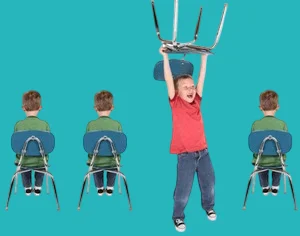Attention Deficit Hyperactivity Disorder (ADHD) is one of the most common neurobehavioral disorders among children. It typically appears in the early years of life, affecting their behavior, concentration, and relationships with others. Parents may notice that their child is hyperactive and impulsive, with difficulty concentrating for extended periods.
Although these behaviors may seem normal in childhood, their persistence and increase may indicate a problem requiring specialist intervention. Understanding this disorder and dealing with it correctly helps the child improve their academic and social performance.
What is Attention Deficit Hyperactivity Disorder (ADHD) in Children
It is a chronic neurobehavioral disorder that begins in childhood and is characterized by three main symptoms: difficulty concentrating, frequent forgetfulness, excessive movement, an inability to remain calm, and acting without thinking, along with impulsiveness.
Types of Attention Deficit Hyperactivity Disorder in Children
- Inattention: The child only suffers from poor concentration, being easily distracted, frequent forgetfulness, and difficulty completing tasks.
- Hyperactivity: The child only suffers from excessive movement, impulsivity, and excessive talkativeness, with an inability to sit still for long periods.
- A common pattern between inattention and hyperactivity: The child combines symptoms of distractibility and impulsivity.
Symptoms of attention deficit hyperactivity disorder in children

- Constant movement.
- Difficulty concentrating.
- Difficulty waiting for one's turn.
- Difficulty sitting still.
- Difficulty following instructions.
- The child loses important things.
- Talks excessively and interrupts others.
- Difficulty organizing tasks and activities.
- Constantly jiggles their legs and hands.
- Easily distracted by external stimuli.
What are the causes of attention deficit hyperactivity disorder (ADHD)
The causes of attention deficit hyperactivity disorder (ADHD) in children are not poor parenting or laziness, but rather a neurological disorder that may be caused by genetics or changes in brain chemicals, such as dopamine and norepinephrine.
It may also be caused by environmental factors, such as maternal exposure to smoking or alcohol during pregnancy, as well as premature birth, low birth weight, lack of oxygen at birth, sleep disturbances, and neurodevelopmental disorders.
How is ADHD diagnosed in children
- The child's medical and behavioral history is taken.
- The child's symptoms persist for 6 months or more.
- The child has 6 or more symptoms.
- A doctor's visit is needed to ensure there are no hearing, vision, or thyroid problems.
- A behavioral assessment is performed for the child.
Complications Associated with ADHD
The child may experience academic complications, such as difficulty keeping up with class, or social and behavioral complications, such as difficulty making friends, irritability, and constant arguments.
Psychological complications may also occur, such as low self-confidence and feelings of failure, or health complications, such as difficulty and sleep disturbances. In the future, the child may face problems with commitment to work and social relationships in their adulthood.
Methods for Dealing with a Child with ADHD

- Organize a daily routine for the child.
- Clearly define tasks for the child.
- Positive reinforcement.
- Divide tasks into small parts.
- Reduce distractions such as television and mobile phones.
- Encourage the child to exercise.
- Avoid punishment and constant criticism.
- See a doctor or psychologist.
- Family support and embrace the child.
Medications to treat attention deficit hyperactivity disorder (ADHD) in children
- Stimulant medications such as amphetamines.
- Non-stimulant medications such as Strattera.
- Antidepressants.
How can a child be protected from ADHD
- It is preferable for the mother to avoid smoking and alcohol during pregnancy.
- Encourage breastfeeding and proper nutrition for the child.
- Ensure regular sleep for the child.
- Encourage physical activity.
- Reduce the use of screens and distractions.
- Monitor the child's academic performance.
- Support the child psychologically and avoid constant criticism.
A Summary of Attention Deficit Hyperactivity Disorder (ADHD) in Children
Attention Deficit Hyperactivity Disorder (ADHD) is a neurobehavioral disorder that appears in childhood and is characterized by inattention, hyperactivity, and impulsivity. It is based on observing symptoms at home and school.
Treatment for this disorder combines medication, behavioral therapy, and family support. Early intervention also helps children live a normal life while avoiding psychological, academic, and social complications.